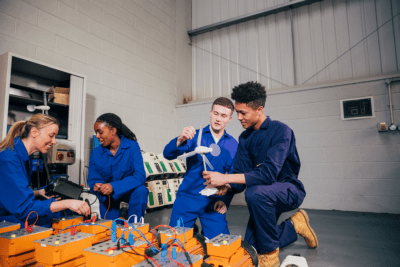Others in the YATD network described similar trajectories in their organizations, as they worked to keep young people engaged in ways that would build their sense of self-confidence and agency in the world. The pandemic made it more challenging to arrange work-based learning experiences for students, said Alia Sutton-Bey, director of operations and youth development at Hopeworks in Camden, New Jersey. Fortunately, she said, “we have realized that we can provide these experiences for some of our students by training them for virtual paid internships within the organization.” One such Hopeworks internship, “community builder,” helps participants develop a sense of belonging and affiliation within the Hopeworks community, despite the remote nature of the programming.
Invest in and Personalize Staff Development
Innovations in programming ultimately rest on frontline and direct-service staff understanding the hows and whys of change, and possessing the skills and supports to take risks and do their work differently. As they did with learners, organization leaders began to engage more frequently with direct service staff to hear their concerns and suggestions. This helped the leadership shape support and training for their staff—not only in how to switch to virtual learning methods, but also in how to help students gain work experience during a pandemic. Leaders also looked to train staff in engaging young people in the types of project-based and work-based learning that will help them build the skills needed to succeed in the emerging post-pandemic economy.
Opportunities for a Better Tomorrow in New York City, which helps young people develop academic skills and attain a high school equivalency while preparing for a career, has increased professional development since the pandemic began. The group uses sector-focused strategies to offer work preparation programs that meet employer needs. Realizing that some direct service staff were struggling to deliver a virtual version of these services, Courtney Granger, OBT’s vice president of programs, identified a staff member with the flexibility and skills to become an in-house instructional coach, meeting one-on-one with other team members to understand their challenges and help them make the transition. “This has made all our services stronger,” Granger said.
Explore Innovative Financing
The sudden program changes brought on by the pandemic highlighted the need for less restricted or unrestricted funding. Income share agreements and other types of fee-for-service work hold promise for entrepreneurial, mission-oriented organizations that need ways to stretch and supplement scarce philanthropic dollars.
Even before the pandemic, Hope Builders in California had experimented with a staffing agency model. “We started with the construction industry, with its strong history of apprenticeship,” said CEO Shawna Smith. “We looked for employers willing to pay Hope Builders a fee for well-prepared interns leading to a direct hire.” Each placed intern resulted in a $3,000 fee paid to the organization. Since employment in the construction industry remained strong despite the pandemic, the organization was able to expand the program. At the same time, leaders took steps to move their IT pathway to this model, starting with two cohorts of young adults. At the start of 2021, Smith said, “the program is doubling in size and will generate close to $350,000 for the organization.”
Toward a Better Normal
Facing the demand for innovation, leaders of organizations supporting young adults are working together on a new and better normal for young people. These leaders are
looking to their peer-learning communities, such as the YATD Network, where they can share what they’ve learned, hear from similar organizations, and work together on developing a coherent field that continues to evolve and grow. JFF is conducting research and will publish findings on how just-in-time labor market analysis can be helpful to organizations as they make changes that anticipate developments in their regional economies and industries, and look to sustain and scale the new practices among the hundreds of organizations across the country engaged in developing the skills and life prospects of young adults.
The pandemic forced changes in our education and workforce systems more rapidly than any of us had foreseen, and we can expect our ways of working and learning to continue evolving at a brisk pace. Given the expectation for continuous change, YATD organizations will need to continue on a path of rapid innovation. Developing a truly new and better normal in young adult talent development will require reforms in and across the many systems that do this vital work. While the emergence of the delta variant and the recent surge in COVID cases has tempered optimism about an imminent recovery, the lessons we learned at the height of the pandemic will continue to have relevance in the years ahead.



